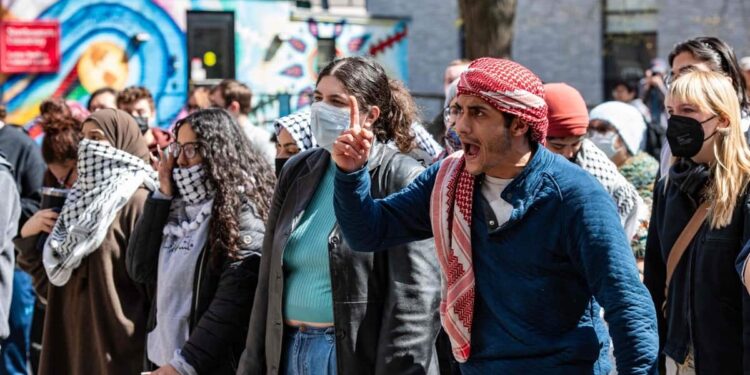One hundred people considered to be pro-Palestinian demonstrators were briefly arrested on Saturday by riot police at a Boston university, the latest episode of a student movement which is becoming widespread in the United States.
• Read also: Jewish students no longer feel safe on American campuses
• Read also: Gaza Support Movement: Columbia University Postpones Campus Evacuation
Starting ten days ago from the prestigious Columbia University in New York, this new wave of support for the Palestinians and against the war led by Israel in the Gaza Strip has spread to a number of establishments, from California to New York. -England (north-east) via the south of the country.
AFP
At Northeastern University in Boston, a large historic city in the northeast which is also home to Harvard, “around 100 individuals were arrested by the police; students who presented their Northeastern U. cards were released (…) Those who refused were arrested,” the university announced on X.
“Killing Jews”
“Violent anti-Semitic insults” such as “killing Jews” were uttered on campus and this “went too far”, thundered the establishment before announcing at the end of the morning a “return to normal”.
An “illegal” encampment of a few tents was dismantled by university police officers and local law enforcement in riot gear, according to images posted on social media.
AFP
The university accused “professional organizers with no affiliation with Northeastern U.” of “infiltrating a student protest that began two days ago.”
The arrested students will be subject to “disciplinary procedures” but “no legal measures”.
AFP
Furthermore, the presidency of Columbia, the epicenter of the student mobilization movement, indicated Friday evening that it had given up on having the New York police evacuate a tent village of 200 people on a lawn on its campus, but announced that a leader of the movement had been banned from entering after comments deemed anti-Zionist in a video.
The young man subsequently presented his “apologies”, according to CNN, which described the campus as “relatively calm” on Saturday.
The situation was, however, tense at the University of Pennsylvania (UPenn), whose president had to resign this winter after statements to Congress in Washington deemed ambiguous on anti-Semitism.
AFP
Following “credible reports of harassment and intimidation,” the presidency ordered the immediate dismantling of an encampment on campus.
And in California, Humboldt Polytechnic University will remain “closed” for the rest of the semester due to the “occupation” of two buildings, according to a press release.
Riot police
Images of riot police arresting students, after university leaders called the police, went around the world.
They echo the movement on American campuses during the Vietnam War. Even the painful memory when the Ohio National Guard opened fire in May 1970 on the campus of Kent State University, killing four peaceful students.
The solidarity movement with Gaza has taken a very political turn seven months before the American presidential election, between allegations of anti-Zionism and anti-Semitism and defense of freedom of expression which is a constitutional right in the United States.
The country has the largest number of Jews in the world behind Israel (some six million) and also millions of Arab-Muslim Americans.
This week, across the United States – particularly in California and Texas – hundreds of students and pro-Palestinian activists were arrested and most often released without prosecution.
And in these rallies for Gaza many Jewish students, often from the left, actively support the Palestinian cause, keffiyeh on their shoulders, also denouncing a “genocide” perpetrated by Israel against the Palestinians.
But many other Jewish American students have expressed discomfort, and even fear, over slogans they consider anti-Semitic.
Thus, Skyler Sieradzky, 21, studies philosophy and political science at George Washington University (GW), in the capital, claimed to have been spat on when he arrived on Thursday with an Israeli flag.
“They call us terrorists, they call us violent. But the only tool we have is our voices,” declared a student at Columbia who introduced herself under the sole name “Mimi.”
The war was triggered on October 7 by an unprecedented attack carried out from Gaza against Israel by Hamas commandos, which resulted in the death of 1,170 people, mainly civilians, according to an AFP report established from official Israeli data.
In retaliation, Israel promised to destroy the Islamist movement, and its vast military operation in the Gaza Strip has so far left 34,388 people dead, mostly civilians, according to Hamas.



